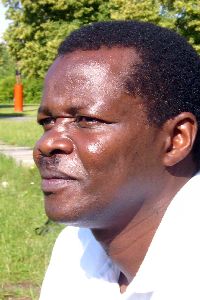Bernardin Mfumbusa

This project focuses on grassroots shari’a debates and their impact on the national consensus. It is about the profile of religion in the Tanzanian public life. A shift of trend in the debates is discernible over the last two decades. From the pre-occupation with the relationship between ujamaa (African socialism) and religion or religion and state in the pre-1985 period to the marginalization and victimization rhetoric which has taken on Muslim versus non-Muslim nuances in the post-1985 period. The pre-1985 debates were largely dominated by foreign researchers intrigued by the ujamaa ideology and its support among both Muslims and Christians.
The current debates are grounded in local communities with the local intelligentsia actively participating. The victimization rhetoric appeals to sectarian sentiments thereby sharpening boundaries among people in terms of religious belonging. Increasingly, people are defining themselves firstly as members of a specific religion; membership in a tribe, a race or a class is becoming secondary. The rhetoric is anchored on the quest for religion-based solutions to social problems.
Tanzanian religious demography is unique for the lack of ‘ghetto-like’ separation of the population in religious lines. Muslims and Christians share the same social space in terms of neighborhoods. Despite the multiple sometimes disparate identities: ethnicity, religion, race, and class, there have been relative peace over the years. After independence in 1961 the government, desperate to avoid religious tensions, came up with a unique injunction: “Don’t mix politics with religion.” Some say, the injunction was meant to steer the country clear of what Nyerere – the father of the nation - called the ‘religion trap.’ Now there are signs that the trap is on the verge of snapping.
This study looks into how victimization and marginalization rhetoric in the context of shari’a debates is helping harden identities across the religious divides. It focuses on the grassroots level where people have co-existed for years their lives shaped by a common destiny as Tanzanians. The aim is to discover how the intensified marginalization rhetoric is affecting local communities; what influences the debates, and the impact of the debates on the social/national cohesion.
This is a case study of Kondoa town in central Tanzania. It has been selected largely because it is a microcosm of the country: multi-ethnic, multi-racial and multi-religious. Though people have lived in relative peace and harmony since independence; signs of radicalization along religious lines are there.
Data collection methods included: interviews, observation, and content analysis of newspaper.
A preliminary exploratory field study was undertaken in September 2006. A total of ten interviews were conducted. Five Muslims and Five Christians were involved at this stage. Seven were laity; three religious leaders.
The ages of interviews ranged from mid-20s to over 70 years. More interviews (25) are planned for July/August 2007.
The content analysis aims at discovering how the discourses in the public sphere are related or vary from the grassroots discourses.
Three newspapers have been identified for study. These are: An-Nūr (Muslim), Kiongozi (Roman Catholic), and Lengo (Lutheran). All are weekly newspapers published in Dar es Salaam.
An-Nūr - a Muslim publication – has been studied. An analysis of 16 editions published between January 2007 and April 2007 was made and 29 articles were identified.[1]
It is emerging from the grassroots and the public discourses the shari’a debates have three dimensions: (1) Muslim versus government; (2) Muslims versus Christians, and (3) Muslims versus Muslims. Issues and themes in the Muslim/government and Muslim/Christian debates sometimes tend to blur. Muslim – Muslim debates focus on the disagreement such as who is a true representative of the Tanzanian Muslims’ interests; difference in practicing rituals and feasts such as Maulid, tarkil or burial ceremonies.
The government/Muslims debate revolves around the government’s perceived failure to address Muslims’ grievances. The grievances range from poor representation in government and education institution to the Muslim right to have Kadhi courts and representation in the Organization of Islamic Conference (OIC).
The Muslim/Christian debates centre on issues such as: da‘wa/proselytization; public rallies (mihadhara/crusades); location of alcohol stores and pork-butchers; and sometimes even location of churches and houses of prayers.
Generally, old traditions are weakening: joint initiation rites are now rare. Both Muslims and Christians are more and more interested in separate kindergartens and even orphanages.[2]
New groups are increasing too. There are at least 10 different Pentecostal groups which were not there ten years ago. Ansar Sunna, Al Mujahhidina, and Shia have appeared among the Muslims in Kondoa area.
One may note the following: (1) a certainautonomy in the grassroots discourses at least in some aspects of the debate, (2) intra-Muslim Tensions are quite pronounced and constitute an important aspect of the debates, and (3) debates to some extent are shaped by external Influences in the Debates such as training of Muslim youths outside the country who some say come with a different attitude. Or Christian NGOs like Compassion and World Vision which are said to have a covert proselytizing agenda.